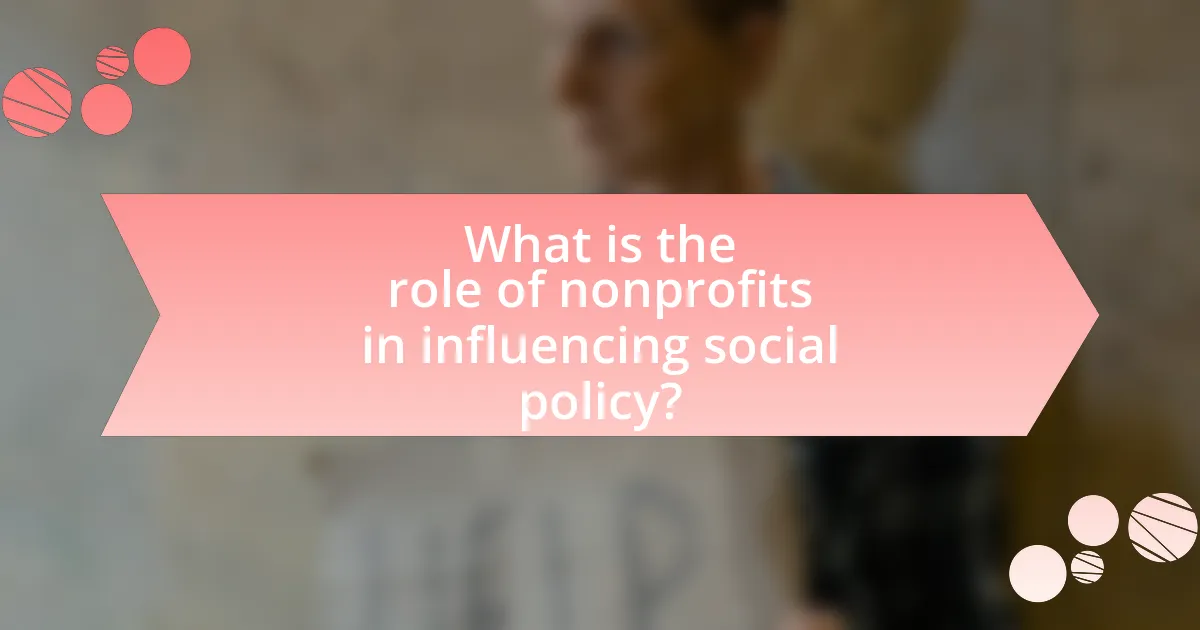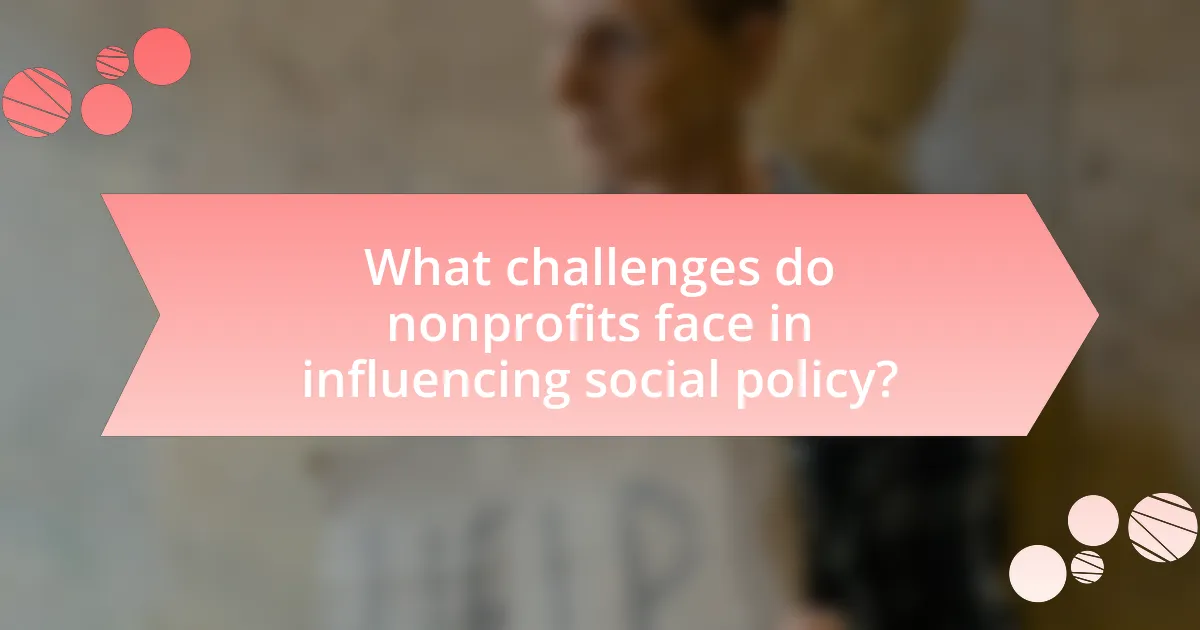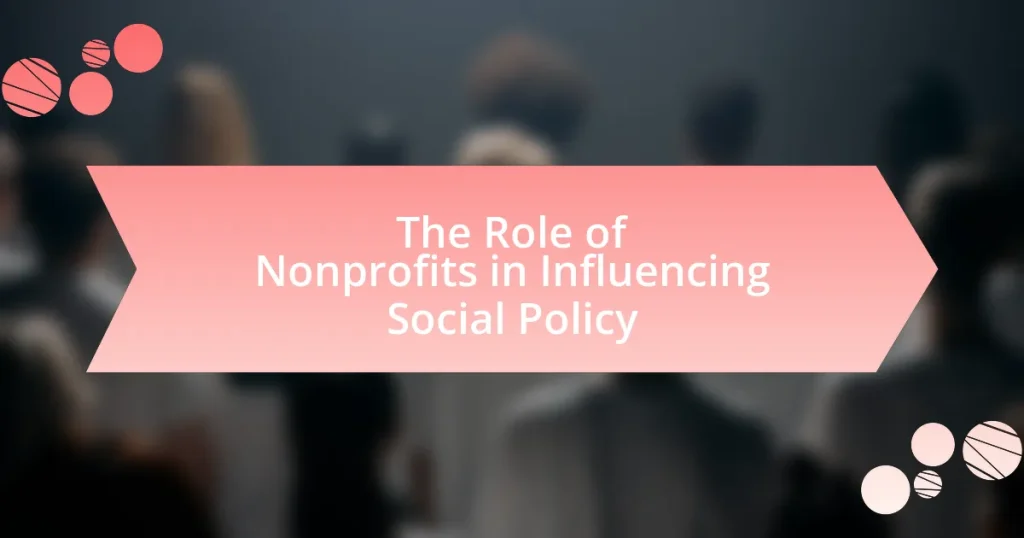Nonprofits play a vital role in shaping social policy by advocating for specific issues, mobilizing communities, and providing expertise to policymakers. They engage in various strategies such as grassroots mobilization, coalition building, and lobbying to influence legislative agendas and ensure that marginalized voices are heard. Through research and data analysis, nonprofits identify pressing social issues and propose evidence-based solutions, enhancing their credibility and effectiveness in advocacy. Additionally, they face challenges such as funding limitations and political climate impacts, which can affect their ability to influence policy. Overall, nonprofits serve as essential intermediaries in the social policy landscape, driving systemic change and addressing gaps in services.

What is the role of nonprofits in influencing social policy?
Nonprofits play a crucial role in influencing social policy by advocating for specific issues, mobilizing communities, and providing expertise to policymakers. They engage in lobbying efforts, conduct research, and raise public awareness to shape legislative agendas. For instance, organizations like the American Civil Liberties Union (ACLU) have successfully influenced policies related to civil rights through strategic litigation and public campaigns. Additionally, nonprofits often serve as intermediaries between marginalized communities and government entities, ensuring that diverse voices are heard in the policymaking process. This multifaceted approach enables nonprofits to effectively impact social policy and drive systemic change.
How do nonprofits engage with social policy issues?
Nonprofits engage with social policy issues primarily through advocacy, research, and community mobilization. These organizations often conduct research to identify social problems and propose policy solutions, thereby influencing legislative agendas. For example, the American Civil Liberties Union (ACLU) has successfully advocated for civil rights legislation by presenting data and legal arguments to lawmakers. Additionally, nonprofits mobilize communities to participate in policy discussions, ensuring that the voices of marginalized groups are heard. This engagement is supported by the fact that nonprofits contribute to over 5% of the U.S. GDP, highlighting their significant role in shaping social policy.
What strategies do nonprofits use to advocate for policy change?
Nonprofits employ various strategies to advocate for policy change, including grassroots mobilization, coalition building, lobbying, and public awareness campaigns. Grassroots mobilization involves engaging community members to participate in advocacy efforts, which can amplify voices and demonstrate public support for specific policies. Coalition building allows nonprofits to unite with other organizations to strengthen their influence and resources, making their advocacy efforts more impactful. Lobbying involves direct interaction with policymakers to persuade them to support specific legislation, often backed by research and data to substantiate their positions. Public awareness campaigns utilize media and communication strategies to educate the public and policymakers about critical issues, thereby shaping public opinion and encouraging policy change. These strategies are supported by evidence showing that coordinated advocacy efforts can lead to significant legislative outcomes, such as the passage of the Affordable Care Act, which was influenced by extensive nonprofit advocacy.
How do nonprofits identify the social issues they want to address?
Nonprofits identify the social issues they want to address through community assessments, stakeholder engagement, and data analysis. Community assessments involve gathering input from local populations to understand their needs and priorities. Stakeholder engagement includes discussions with community leaders, beneficiaries, and other organizations to gain insights into pressing social challenges. Data analysis utilizes statistics and research studies to identify trends and gaps in services, ensuring that nonprofits focus on issues that are both relevant and impactful. For instance, a report by the National Council of Nonprofits highlights that effective nonprofits often rely on both qualitative and quantitative data to inform their decision-making processes, ensuring their efforts align with community needs.
Why are nonprofits important in the social policy landscape?
Nonprofits are crucial in the social policy landscape because they advocate for marginalized communities and address social issues that may be overlooked by government entities. These organizations often serve as a bridge between the public and policymakers, providing essential data, research, and firsthand accounts that inform policy decisions. For instance, according to a report by the National Council of Nonprofits, nonprofits contribute over $1 trillion to the U.S. economy and employ more than 10% of the workforce, highlighting their significant role in shaping economic and social policies. Additionally, nonprofits mobilize grassroots movements, influencing public opinion and legislative agendas, which further underscores their importance in the social policy arena.
What unique perspectives do nonprofits bring to social policy discussions?
Nonprofits bring grassroots insights and community-focused perspectives to social policy discussions. These organizations often operate at the local level, allowing them to understand the specific needs and challenges faced by marginalized populations. For instance, a study by the National Council of Nonprofits highlights that nonprofits frequently advocate for policies that reflect the voices of those they serve, ensuring that social policies are inclusive and equitable. Additionally, nonprofits often possess specialized knowledge in areas such as health, education, and housing, which can inform evidence-based policy recommendations. This unique combination of community engagement and subject matter expertise positions nonprofits as vital contributors to shaping effective social policies.
How do nonprofits complement government efforts in social policy?
Nonprofits complement government efforts in social policy by addressing gaps in services and advocating for marginalized communities. They often provide specialized programs that target specific social issues, such as homelessness or education, which may not be fully addressed by government initiatives. For instance, according to the National Council of Nonprofits, nonprofits deliver over 25% of the social services in the United States, demonstrating their critical role in filling service gaps. Additionally, nonprofits engage in advocacy and public awareness campaigns that influence policy decisions, as seen in the work of organizations like the American Civil Liberties Union, which has successfully shaped legislation on civil rights issues. This collaboration enhances the overall effectiveness of social policy by leveraging the strengths of both sectors.

What are the key mechanisms through which nonprofits influence social policy?
Nonprofits influence social policy primarily through advocacy, research, and community mobilization. Advocacy involves lobbying government officials and engaging in public campaigns to raise awareness about specific issues, which can lead to policy changes. For example, organizations like the American Civil Liberties Union have successfully influenced legislation by advocating for civil rights protections. Research conducted by nonprofits provides data and insights that inform policymakers, demonstrating the impact of certain policies or highlighting gaps in existing laws. The Urban Institute, for instance, conducts studies that shape discussions on social welfare policies. Community mobilization engages citizens in grassroots efforts, fostering collective action that pressures policymakers to address community needs, as seen in movements led by organizations like Habitat for Humanity. These mechanisms collectively empower nonprofits to shape and influence social policy effectively.
How do nonprofits utilize research and data in their advocacy?
Nonprofits utilize research and data in their advocacy by employing evidence-based strategies to inform policy decisions and mobilize public support. They conduct studies, gather statistics, and analyze trends to highlight social issues, demonstrating the need for change. For instance, a report by the Urban Institute found that nonprofits that leverage data effectively can increase their influence on policymakers by providing concrete evidence of the impact of social issues, such as poverty or healthcare access. This data-driven approach not only strengthens their arguments but also enhances credibility, making it easier to engage stakeholders and secure funding for initiatives aimed at social reform.
What role does evidence-based policy play in nonprofit advocacy?
Evidence-based policy plays a crucial role in nonprofit advocacy by providing a solid foundation for decision-making and influencing public policy. Nonprofits utilize data and research to support their positions, which enhances their credibility and effectiveness in advocating for social change. For instance, studies show that organizations employing evidence-based strategies are more likely to achieve policy outcomes, as they can demonstrate the impact of their proposed solutions through empirical evidence. This approach not only strengthens the argument for specific policies but also helps in mobilizing stakeholders and securing funding, as funders often prefer to invest in initiatives backed by reliable data.
How do nonprofits measure the impact of their advocacy efforts?
Nonprofits measure the impact of their advocacy efforts through a combination of quantitative and qualitative metrics. They often utilize surveys to gauge public opinion changes, track legislative outcomes related to their campaigns, and analyze media coverage to assess shifts in narrative. For instance, a study by the Center for Nonprofit Advancement found that 70% of nonprofits reported using specific metrics such as policy changes or increased funding as indicators of successful advocacy. Additionally, nonprofits may conduct case studies to illustrate the real-world effects of their advocacy, providing concrete examples of how their efforts have influenced social policy.
What partnerships do nonprofits form to enhance their influence?
Nonprofits form strategic partnerships with government agencies, businesses, and other nonprofits to enhance their influence. These collaborations allow nonprofits to leverage resources, share expertise, and amplify their advocacy efforts. For instance, partnerships with government entities can provide nonprofits access to funding and policy-making processes, while alliances with businesses can lead to corporate sponsorships and increased visibility. Research by the National Council of Nonprofits indicates that such collaborations can significantly enhance a nonprofit’s capacity to effect change in social policy, demonstrating the effectiveness of collective action in addressing societal issues.
How do collaborations with other organizations amplify nonprofit efforts?
Collaborations with other organizations amplify nonprofit efforts by enhancing resource sharing, increasing outreach, and leveraging diverse expertise. When nonprofits partner with businesses, government agencies, or other nonprofits, they can pool financial resources, share knowledge, and access broader networks. For instance, a study by the Stanford Social Innovation Review found that collaborative initiatives can lead to a 30% increase in program effectiveness due to combined strengths and shared goals. This synergy not only maximizes impact but also fosters innovation, allowing nonprofits to address complex social issues more effectively.
What role do coalitions play in nonprofit advocacy for social policy?
Coalitions play a critical role in nonprofit advocacy for social policy by uniting diverse organizations to amplify their collective voice and influence. By collaborating, these coalitions enhance resource sharing, increase visibility, and strengthen lobbying efforts, which can lead to more effective policy change. For instance, the Coalition for the Homeless in New York City successfully brought together various nonprofits to advocate for increased funding and support for homeless services, resulting in significant policy shifts and funding increases. This demonstrates how coalitions can leverage their combined expertise and networks to achieve common goals in social policy advocacy.

What challenges do nonprofits face in influencing social policy?
Nonprofits face significant challenges in influencing social policy, primarily due to limited financial resources, lack of political influence, and difficulties in mobilizing public support. Financial constraints hinder their ability to conduct extensive research, advocacy campaigns, and outreach efforts, which are essential for effective policy influence. Additionally, many nonprofits lack the political connections and lobbying power that larger organizations or corporations possess, making it harder to gain access to decision-makers. Furthermore, mobilizing public support can be challenging, as nonprofits often compete for attention in a crowded media landscape, which can dilute their messages and reduce their impact on policy discussions. These factors collectively impede the ability of nonprofits to effect meaningful change in social policy.
How do funding limitations affect nonprofit advocacy efforts?
Funding limitations significantly hinder nonprofit advocacy efforts by restricting their ability to mobilize resources, conduct research, and engage in outreach activities. Nonprofits often rely on grants and donations to support their advocacy initiatives; when funding is insufficient, they may struggle to maintain staff, develop programs, or sustain campaigns. For instance, a study by the National Council of Nonprofits found that 70% of nonprofits reported that funding constraints limited their capacity to advocate effectively for policy changes. This lack of financial support can lead to reduced visibility and influence in policy discussions, ultimately diminishing their role in shaping social policy.
What strategies can nonprofits employ to overcome funding challenges?
Nonprofits can employ diverse strategies to overcome funding challenges, including diversifying revenue streams, building strong relationships with donors, and leveraging technology for fundraising. Diversifying revenue streams allows nonprofits to reduce reliance on a single source of funding, which can be critical during economic downturns; for instance, organizations can explore grants, individual donations, corporate sponsorships, and earned income strategies. Building strong relationships with donors fosters trust and encourages long-term support; research indicates that nonprofits with engaged donor relationships see a 20% increase in funding over time. Additionally, leveraging technology, such as crowdfunding platforms and social media campaigns, can expand outreach and attract new supporters, as evidenced by the 2019 Nonprofit Fundraising Study, which found that organizations utilizing digital tools raised 30% more than those that did not.
How does political climate impact nonprofit influence on social policy?
The political climate significantly impacts nonprofit influence on social policy by shaping the regulatory environment, funding availability, and public perception. In a supportive political climate, nonprofits can more effectively advocate for policy changes, as seen during the Obama administration, which increased funding for social programs and encouraged nonprofit engagement. Conversely, in a hostile political climate, such as during the Trump administration, nonprofits faced funding cuts and regulatory challenges that limited their ability to influence policy. Research indicates that nonprofits are more successful in policy advocacy when aligned with the prevailing political ideology, as demonstrated by the increased effectiveness of organizations advocating for social justice during progressive administrations.
What ethical considerations must nonprofits navigate in their advocacy?
Nonprofits must navigate several ethical considerations in their advocacy, including transparency, accountability, and the potential for conflicts of interest. Transparency requires nonprofits to openly communicate their goals, funding sources, and the implications of their advocacy efforts to maintain public trust. Accountability involves being responsible for the outcomes of their advocacy, ensuring that their actions align with their mission and the needs of the communities they serve. Additionally, nonprofits must be vigilant about conflicts of interest, ensuring that their advocacy does not prioritize the interests of donors or board members over the communities they represent. These ethical considerations are crucial for maintaining credibility and effectiveness in influencing social policy.
How do nonprofits ensure transparency and accountability in their efforts?
Nonprofits ensure transparency and accountability in their efforts by implementing rigorous financial reporting practices and adhering to ethical standards. These organizations often publish annual reports that detail their financial activities, program outcomes, and governance structures, which are accessible to the public. For instance, the National Council of Nonprofits emphasizes the importance of transparency through the use of Form 990, a tax document that nonprofits must file, providing insights into their financial health and operational practices. Additionally, many nonprofits engage in third-party evaluations and audits to validate their impact and financial integrity, further reinforcing their commitment to accountability.
What are the potential conflicts of interest for nonprofits in policy advocacy?
Potential conflicts of interest for nonprofits in policy advocacy include reliance on funding sources that may influence their positions, relationships with government entities that could compromise their independence, and the potential for mission drift when aligning with corporate interests. Nonprofits often depend on grants and donations, which can lead to pressure to advocate for specific policies that align with funders’ agendas rather than the organization’s mission. For instance, a nonprofit focused on environmental issues may face conflicts if a corporate donor has interests in fossil fuels. Additionally, partnerships with government agencies can create a perception of bias, undermining the nonprofit’s credibility. Research indicates that these conflicts can lead to ethical dilemmas, as nonprofits must balance their advocacy efforts with the expectations of their stakeholders.
What best practices can nonprofits adopt to enhance their influence on social policy?
Nonprofits can enhance their influence on social policy by engaging in strategic advocacy, building coalitions, and utilizing data-driven approaches. Strategic advocacy involves clearly defining policy goals and effectively communicating them to stakeholders, which can lead to increased visibility and support. Building coalitions with other organizations amplifies their voice and resources, allowing for a more significant impact on policy discussions. Utilizing data-driven approaches, such as collecting and analyzing relevant statistics, strengthens their arguments and demonstrates the need for policy changes. For instance, a study by the National Council of Nonprofits highlights that nonprofits that leverage data effectively can influence policymakers by providing evidence of community needs and the effectiveness of proposed solutions.
How can nonprofits effectively communicate their message to policymakers?
Nonprofits can effectively communicate their message to policymakers by utilizing clear, concise messaging that highlights the urgency and relevance of their issues. This involves crafting tailored messages that resonate with policymakers’ priorities, supported by data and real-life stories that illustrate the impact of their work. For instance, a study by the National Council of Nonprofits indicates that effective advocacy includes establishing relationships with policymakers, providing them with actionable solutions, and engaging in consistent follow-up to reinforce the nonprofit’s position. By employing these strategies, nonprofits can enhance their influence in shaping social policy.
What role does community engagement play in successful advocacy efforts?
Community engagement is crucial for successful advocacy efforts as it fosters trust, mobilizes support, and amplifies the voices of those affected by the issues at hand. Engaged communities are more likely to participate in advocacy initiatives, leading to increased visibility and pressure on policymakers. For instance, research by the National Council of Nonprofits indicates that advocacy campaigns that involve community members see a 30% higher success rate in influencing policy changes compared to those that do not engage the community. This demonstrates that community involvement not only enhances the legitimacy of advocacy efforts but also creates a collective power that can drive significant social change.
